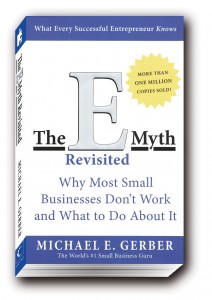I just finished reading The E-Myth Revisited by Michael Gerber. I think this book is a must read for leaders in any type of industry because it forces you to evaluate if you are leading from your sweet spot or if you are leading out of panic and chaos. The book is written to entrepreneurs to help them evaluate how to move their small business from where it is to where they’d ultimately like to see it go. Gerber writes in a way that feels like a conversation. A conversation at times that is had with a good friend, while other times it feels more like talking with a consultant. Either way, they are all profitable conversations to be had as you evaluate the success of your business.
Here are some thoughts I highlighted while reading…
- Contrary to popular belief, my experience has shown me that the people who are exceptionally good in business aren’t so because of what they know but because of their insatiable need to know more.
- The simple truth about the greatest businesspeople I have known is that they have a genuine fascination for the truly astonishing impact little things done exactly right can have on the world.
- If your thinking is sloppy, your business will be sloppy. If you are disorganized, your business will be disorganized. If you are greedy, your employees will be greedy, giving you less and less of themselves and always asking for more. If your information about what needs to be done in your business is limited, your business will reflect that limitation.
- That Fatal Assumption is: if you understand the technical work of a business, you understand a business that does that technical work.
- The entrepreneurial personality turns the most trivial condition into an exceptional opportunity.
- A Mature company is started differently than all the rest. A Mature company is founded on a broader perspective, an entrepreneurial perspective, a more intelligent point of view. About building a business that works not because of you but without you.
- The Entrepreneurial Perspective starts with a picture of a well-defined future, and then comes back to the present with the intention of changing it to match the vision.
- Thus, the Entrepreneurial Model does not start with a picture of the business to be created but of the customer for whom the business is to be created. It understands that without a clear picture of that customer, no business can succeed.
- Your business and your life are two totally separate things.
- Tolerance for failure is a very specific part of the excellent company culture—and that lesson comes directly from the top. Champions have to make lots of tries and consequently suffer some failures or the organization won’t learn.
- “Creativity thinks up new things. Innovation does new things.”
- Orchestration is the elimination of discretion, or choice, at the operating level of your business.
- “The difference between a warrior and an ordinary man is that a warrior sees everything as a challenge, while an ordinary man sees everything as either a blessing or a curse.”
- Your Strategic Objective is a very clear statement of what your business has to ultimately do for you to achieve your Primary Aim.
- What’s your product? What feeling will your customer walk away with? Peace of mind? Order? Power? Love? What is he really buying when he buys from you?
- The truth is, nobody’s interested in the commodity. People buy feelings.
- It’s our automatic nature we’ve got to organize into an intentional nature.
- The System is the Solution.
- Every single element was an orchestrated solution designed to produce a marketing result, an integrated component of the hotel’s Management System.
- ‘The work we do is a reflection of who we are. If we’re sloppy at it, it’s because we’re sloppy inside. If we’re late at it, it’s because we’re late inside. If we’re bored by it, it’s because we’re bored inside, with ourselves, not with the work. The most menial work can be a piece of art when done by an artist. So the job here is not outside of ourselves, but inside of ourselves. How we do our work becomes a mirror of how we are inside.’”
- Work is passive without you. It can’t do anything. Work is only an idea before a person does it. But the moment a person does it, the impact of the work on the world becomes a reflection of that idea—the idea behind the work—as well as the person doing it.
- When it comes to marketing, what you want is unimportant. It’s what your customer wants that matters.
- “Find a perceived need and fill it.”
- A system is a set of things, actions, ideas, and information that interact with each other, and in so doing, alter other systems.
- To approach any part of your business as though it were separate from all the rest would be lunacy, because everything in your business affects everything else in your business.
- When you hear something, you will forget it. When you see something, you will remember it. But not until you do something, will you understand it.
